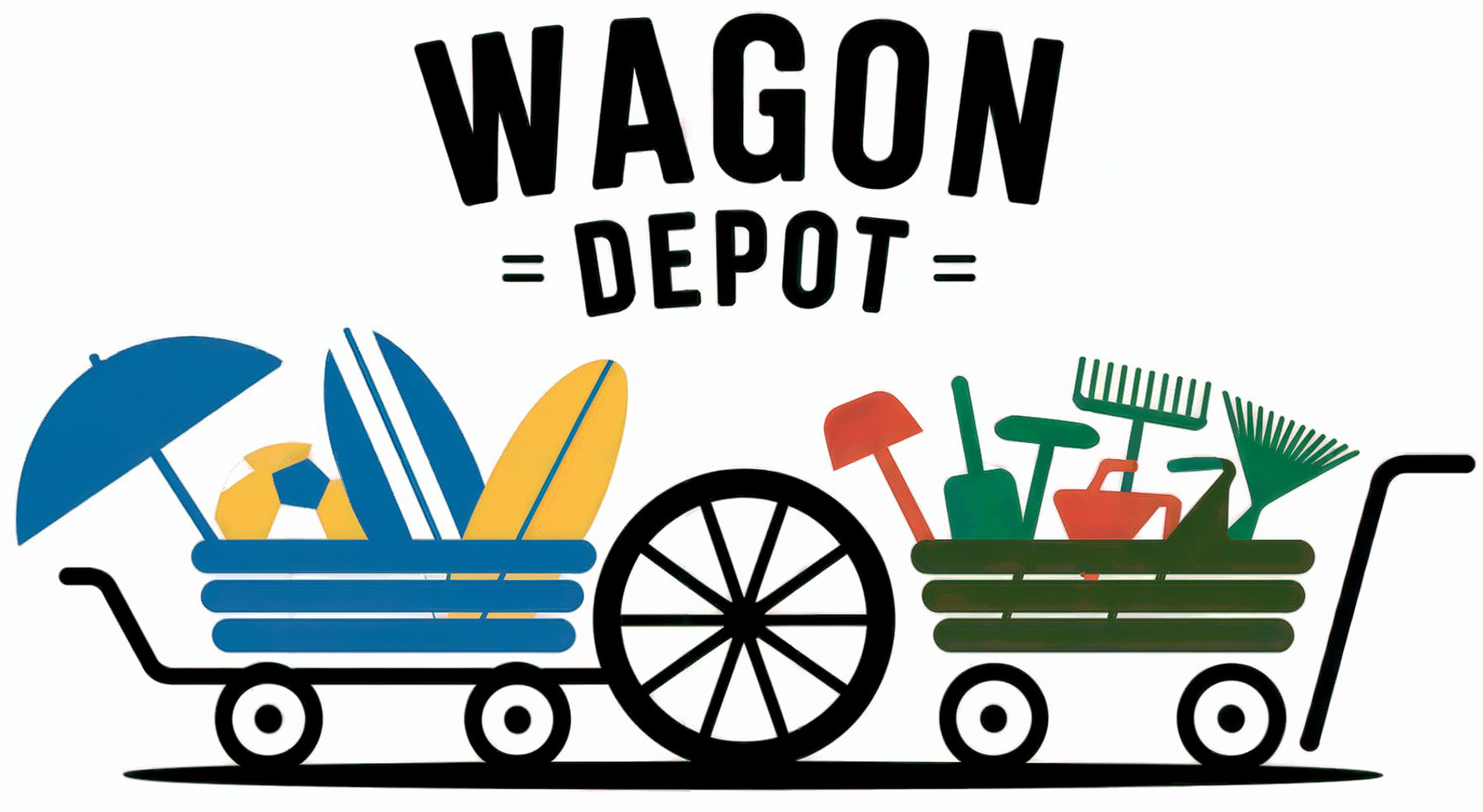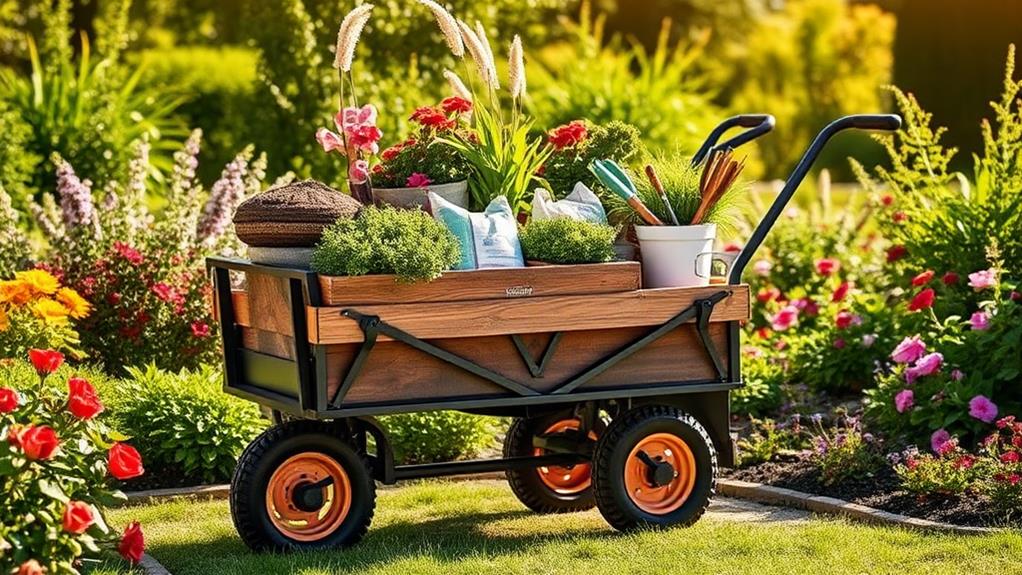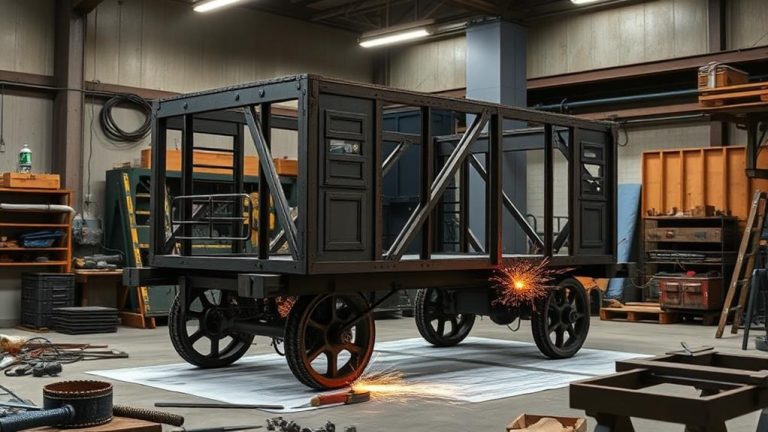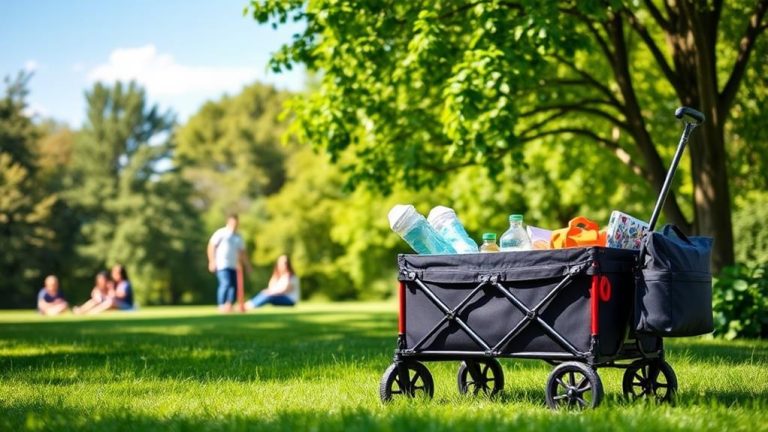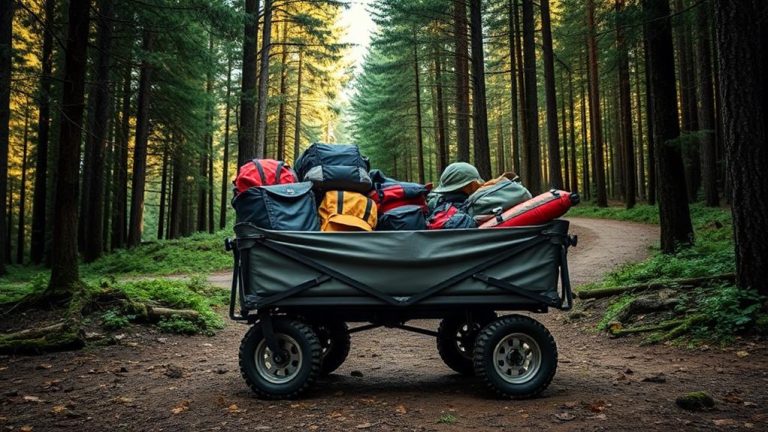Selecting a robust garden cart is vital for your landscaping tasks. You'll appreciate the strength and durability that allow it to handle heavy loads like soil, tools, and plants without buckling. With features such as ergonomic designs and sturdy wheels, maneuvering uneven terrain becomes easier. These carts often last longer than lighter alternatives, saving you money over time. They're adaptable for various projects, helping you tackle seasonal challenges. Plus, comprehending their weight capacities guarantees safe usage. This investment in a reliable cart can improve your gardening experience, making every task more efficient. Discover additional insights to enrich your landscaping expedition.
Advantages of Heavy Duty Wagons
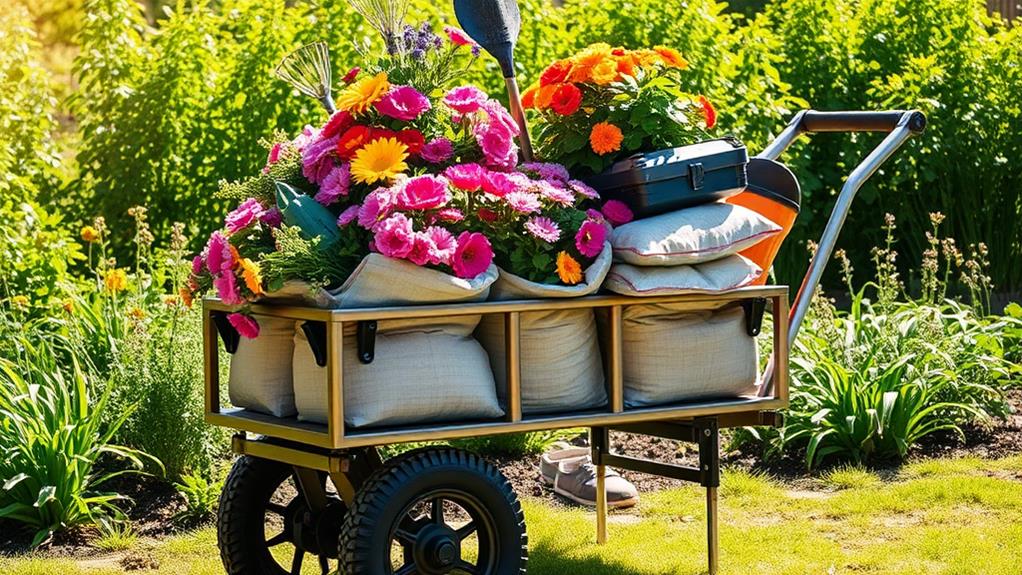
In regards to efficiency in landscaping, the strength and durability of heavy-duty wagons become paramount. When you're tackling a demanding outdoor project, the last thing you want is a flimsy cart that can't handle the load. Heavy-duty construction guarantees that these wagons can carry substantial weights, allowing you to transport soil, tools, and plants seamlessly.
One of the key garden cart benefits is versatility. Whether you're moving heavy bags of mulch or transporting equipment across uneven terrain, a robust garden cart supports your diverse needs without compromising performance. This adaptability allows you to focus on your landscaping tasks rather than worrying about your tools failing you.
Moreover, investing in a heavy-duty wagon means reduced wear and tear over time. Unlike lighter alternatives, these carts can withstand the rigors of regular use, making them a cost-effective choice in the long run. You'll appreciate the time saved by not having to replace equipment frequently. In the end, choosing a heavy-duty wagon empowers you to embrace your landscaping projects with confidence, knowing you have reliable support that matches your passion for creating beautiful outdoor spaces.
Key Features to Look For
When selecting a robust garden cart for landscaping, several key features can greatly improve its functionality and usability. First, consider the ergonomic design. A cart with a comfortable handle and adjustable height can minimize strain on your back and arms, allowing you to maneuver easily during the transport of heavy loads. Look for padded grips and a design that promotes natural movement, guaranteeing you can work efficiently without discomfort.
Next, evaluate the wheel types. The wheels should be sturdy and suited for various terrains, whether you're traversing through gravel, grass, or muddy areas. Pneumatic wheels are excellent for shock absorption and stability, while solid rubber wheels offer durability and low maintenance. A cart with a swivel front wheel can improve maneuverability, making tight corners a breeze.
Additionally, check the cart's weight capacity. A robust model should support your landscaping needs without buckling under pressure. Finally, consider features like removable sides or foldable designs, which can add versatility to your gardening tasks. By focusing on these key features, you'll guarantee your garden cart becomes an invaluable tool in your landscaping endeavors.
Best Materials for Durability
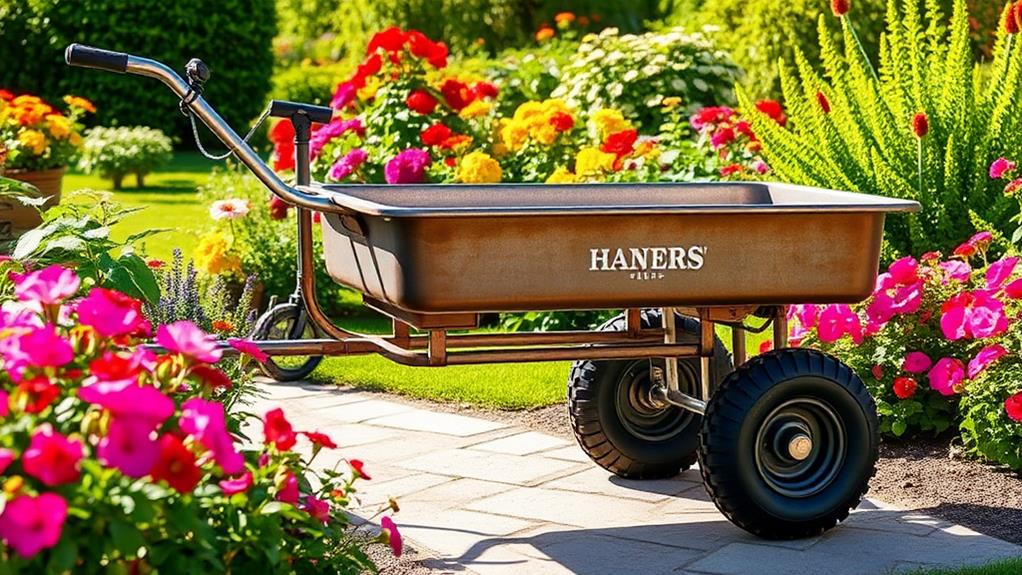
When choosing a garden cart, the material can greatly impact its durability and performance. Steel offers strength and stability, whereas aluminum provides lightweight maneuverability, making it crucial to weigh the pros and cons of each. Moreover, incorporating weather-resistant materials can improve longevity, ensuring your cart withstands the elements over time.
Steel vs. Aluminum Carts
Choosing the right material for your garden cart can considerably impact its performance and longevity. When comparing steel and aluminum carts, each material presents unique advantages suited to different landscaping needs.
Steel carts boast incredible strength, making them ideal for hauling heavy loads like soil or stone. Their durability means they can withstand rigorous use, which is crucial for those who push their gardening limits. Nevertheless, this strength comes with added weight, which can be cumbersome when maneuvering.
On the other hand, aluminum carts shine in their lightweight nature. This characteristic allows for easy transport and handling, making them perfect for quick tasks around your garden. Although aluminum may not match steel's robustness, it's resistant to rust, ensuring that your cart maintains its form and function over time.
Ultimately, the choice between steel and aluminum should reflect your landscaping style and load requirements. If you value strength and heavy-duty performance, steel might be your go-to. But if you prefer a nimble, easy-to-maneuver option, aluminum's lightweight design can set you free to explore your garden without the struggle.
Weather-Resistant Materials
Though both steel and aluminum have their advantages, the durability of your garden cart further depends on its resistance to weather conditions. When you're investing in a garden cart, consider materials that improve weather resistance and material longevity. For instance, stainless steel offers exceptional strength while resisting rust, making it perfect for those rainy days or humid climates.
On the other hand, aluminum is lightweight and naturally resistant to corrosion, but it can be susceptible to dents and scratches, especially in rugged landscaping environments. It's essential to weigh these factors based on your specific needs.
Moreover, look for carts with UV-resistant coatings. These coatings can greatly extend the life of the cart's finish and prevent fading. Rubberized wheels are worth noting; they provide excellent grip and resist cracking or hardening under extreme temperatures.
Ultimately, selecting the right materials guarantees your garden cart withstands the elements, allowing you to focus on your landscaping efforts rather than worrying about wear and tear. By prioritizing weather-resistant materials, you're choosing a tool that complements your desire for freedom in the garden, empowering you to tackle any project that comes your way.
Weight Capacity Considerations
When selecting a garden cart, comprehension of its maximum load limits is essential to guarantee safe and effective use. The materials used in its construction not just contribute to durability but additionally directly influence how much weight it can safely carry. By balancing these factors, you can optimize both the performance and longevity of your cart.
Maximum Load Limits
Grasping the maximum load limits of a garden cart is fundamental for optimizing its performance and ensuring safety during use. You need to recognize that each cart has a specific weight capacity, determined by its design and materials. Overloading your cart can lead to catastrophic failures or accidents, which is why adhering to safety standards is imperative.
Proper load distribution plays a significant role in maintaining balance and preventing tip-overs. When you load your cart, aim to distribute the weight evenly across its surface. This not only improves stability but additionally prolongs the lifespan of the cart. If you frequently transport heavy materials, consider a cart designed with higher weight limits. It's not merely about lifting; it's about lifting intelligently.
Furthermore, be aware that exceeding the recommended load can void warranties and lead to costly repairs. Investing in a robust garden cart means comprehending these limits and respecting them to enjoy the freedom of efficient landscaping. When you choose wisely, you empower yourself to tackle any project without compromising safety or performance. Prioritize knowledge of your cart's capabilities, and you'll reap the benefits on every landscaping adventure.
Material Durability Impact
The materials used in a garden cart greatly influence its durability and, as a result, its weight capacity. You want a cart that not only holds up under pressure but likewise lasts through the seasons. Proper material selection is crucial for ensuring your cart can handle heavy loads without compromise.
Consider these three vital longevity factors when evaluating a garden cart:
- Frame Material: Steel or aluminum frames offer superior strength. Aluminum is lightweight, whereas steel provides added durability.
- Tire Composition: Pneumatic tires can absorb shocks and provide better traction, increasing stability under heavy loads.
- Deck Material: High-quality wood or reinforced plastic can withstand wear and tear, ensuring your cart remains functional for years.
Versatility in Landscaping Tasks
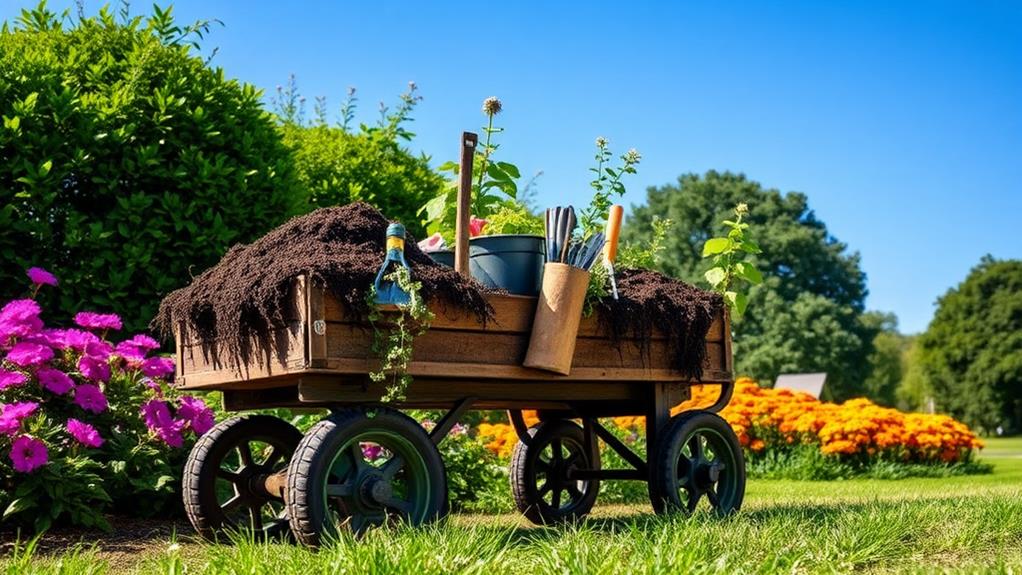
A robust garden cart is an indispensable tool that improves versatility in landscaping tasks, making it easier for you to tackle a variety of projects with efficiency. Whether you're hauling soil, plants, or tools, its design supports ideal load distribution, ensuring you can transport heavy items without straining your back. This thoughtful engineering not only boosts your productivity but also extends the life of the cart itself.
You'll find that a well-designed garden cart offers ample tool storage, allowing you to keep all necessary equipment within reach. This means you can seamlessly shift between tasks—whether planting, weeding, or mulching—without the hassle of running back and forth. The flexibility provided by a robust garden cart means you're not limited to just one type of landscaping project; you can adapt your approach based on the season or your creative vision.
Furthermore, the ability to customize your cart with attachments or compartments improves its functionality, giving you the freedom to design your own workflow. By investing in a versatile garden cart, you empower yourself to take on diverse landscaping challenges, transforming your outdoor space into a reflection of your personal style.
Maneuverability and Ease of Use
Making your way through various terrains in your garden becomes effortless with a well-designed garden cart that emphasizes maneuverability and ease of use. With the right ergonomic design, you can navigate tight corners and uneven ground without breaking a sweat. Selecting the appropriate wheel types is essential for this experience.
Consider these three factors when choosing your garden cart:
- Wheel Size: Larger wheels can tackle rough, uneven surfaces, whereas smaller wheels excel on paved paths.
- Wheel Material: Pneumatic wheels provide shock absorption on bumpy terrain, whereas solid rubber wheels offer durability for everyday use.
- Swivel Capability: Carts with swivel front wheels allow for sharper turns, making it easier to maneuver around plants and obstacles.
Incorporating these elements into your cart choice will improve your gardening experience, granting you the freedom to explore your environment with ease. You'll find that a robust garden cart isn't just a tool; it's an extension of your gardening passion, empowering you to work more efficiently and enjoyably in your outdoor sanctuary.
Maintenance Tips for Longevity
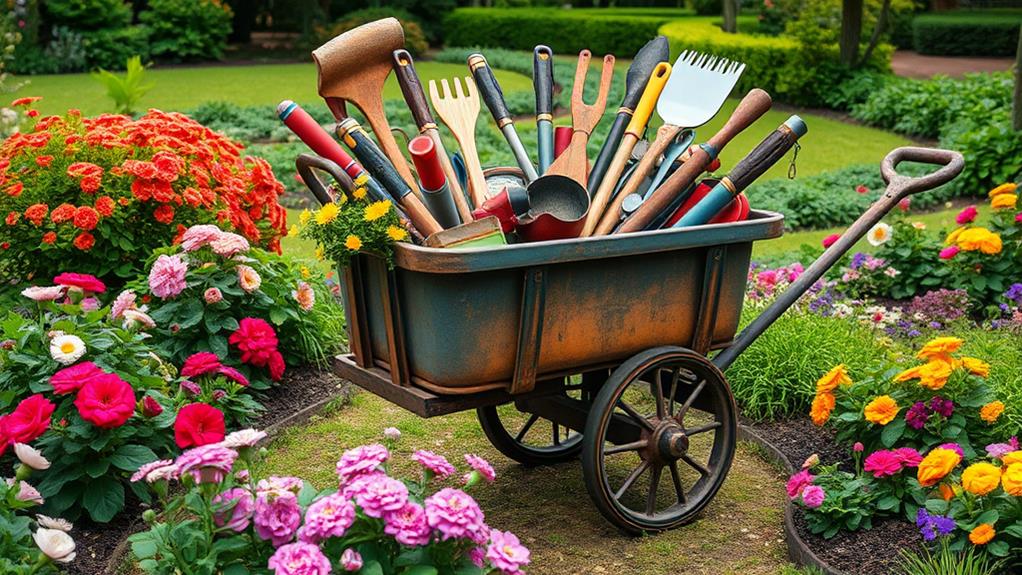
Maintaining your garden cart in top condition is as crucial as selecting the right model. To achieve longevity, you'll want to implement a few key maintenance habits. First, regular cleaning is vital. After each use, remove dirt, debris, and any organic material that could lead to corrosion or decay. A simple hose-down followed by a thorough drying can prevent rust and keep your cart looking new.
Next, consider proper storage. When you're not using your cart, store it in a dry, sheltered area, such as a garage or shed. This protects it from the elements and aids you in avoiding potential damage from UV exposure and extreme temperatures. If you can, lift your cart off the ground to prevent moisture accumulation.
Furthermore, inspect the wheels and frame periodically for any signs of wear or damage. Lubricating moving parts will guarantee smooth operation and prevent squeaks or stiffness. By committing to these practices, you're not merely maintaining your cart; you're investing in years of reliable service that improves your landscaping adventures. Remember, a well-cared-for garden cart can be your steadfast ally in turning your outdoor dreams into reality.
Cost-Effectiveness Over Time
Over time, the cost-effectiveness of investing in a robust garden cart becomes increasingly apparent as you weigh the initial purchase against its long-term benefits. When you consider the durability and versatility of a quality cart, the potential for long-term savings and investment value shines through.
Here are three key factors that contribute to its cost-effectiveness:
- Durability: A robust garden cart is designed to withstand heavy loads and tough conditions, meaning you won't need frequent replacements.
- Multi-functionality: These carts can handle various tasks—transporting soil, plants, tools, or debris—eliminating the need for multiple tools and saving you money in the long run.
- Time Efficiency: With a reliable cart, you'll spend less time making multiple trips and more time enjoying your landscaping projects, effectively increasing your productivity.
Frequently Asked Questions
Can a Garden Cart Be Used for Other Outdoor Activities?
A garden cart's versatile uses extend well beyond gardening. Whether you're hauling heavy supplies for home improvement, transporting tools for a picnic, or even moving firewood for a cozy campfire, it's a handy helper for various outdoor projects. You'll find that its sturdy structure and spacious design make it perfect for any task. So, embrace the freedom of your outdoor adventures with a trusty garden cart!
How Do I Choose the Right Size Garden Cart?
Choosing the right size garden cart depends on your specific needs. Consider the garden cart types available, like flatbeds or utility carts, to match your tasks. Think about the materials, too—metal carts offer durability, whereas plastic ones are lighter. If you often transport heavy loads, opt for a larger size. Conversely, if you need maneuverability in tight spaces, a smaller cart might be best. Balance size with functionality to maximize your gardening freedom.
Are There Specific Brands Known for Quality Garden Carts?
In the realm of garden carts, you don't want to put all your eggs in one basket. Brands like Gorilla Carts and Ames are known for their durability features, making them stand out in brand comparisons. Look for carts with heavy-duty frames and weather-resistant materials that can withstand tough conditions. By choosing wisely, you'll guarantee your investment lasts, giving you the freedom to tackle any landscaping project with ease and confidence.
What Accessories Can Enhance My Garden Cart's Functionality?
To improve your garden cart's functionality, consider accessories like tool organizers and extra load capacity options. Tool organization systems keep your gardening tools handy and easily accessible, streamlining your workflow. Moreover, upgrading your cart's load capacity with reinforced sides or removable trays allows you to carry more without compromising stability. These improvements not only enhance efficiency but likewise give you the freedom to tackle larger projects with ease, making your landscaping tasks enjoyable.
How Do Weather Conditions Affect Garden Cart Performance?
Weather conditions can greatly influence your garden cart's performance. Rain or snow may lead to durability concerns, causing rust or weakening materials. Extreme heat can warp plastic components, whereas cold temperatures might make metals brittle. It's essential to take into account these weather impacts when selecting a cart. Opting for corrosion-resistant materials and protective coatings can improve longevity, ensuring your cart remains functional and reliable, no matter the elements you face as you tend to your garden.
